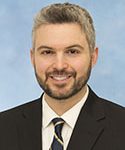NIDUS Blog
Investigator of the Month (July 2024): Dr. Sara C. LaHue
Dr. Sara C. LaHue is an Assistant Professor of Neurology at UCSF, where she also earned her medical degree and completed both her neurology residency and neurohospitalist fellowship. As a Buck Institute for Research on Aging Visiting Scientist and NIA Butler-Williams Scholar, Dr. LaHue is dedicated to advancing the care of older hospitalized adults. Her […]
Prevalence of clinical electroencephalography findings in stroke patients with delirium
Contributed by Noa Mintz, ScB, Brown University, Providence, RI and Michael Reznik, MD, Department of Critical Care Medicine & Neurology, University of Pittsburgh, Pittsburgh, PA Background Patients with acute stroke are at a high risk for delirium, which may occur in up to half of cases depending on the type of stroke.1–4 However, post-stroke delirium […]
Investigator of the Month (June 2024): Dr. Roderic Eckenhoff
Dr. Roderic Eckenhoff is the Austin Lamont Professor of Anesthesia at the University of Pennsylvania Perelman School of Medicine. His primary area of research has been the molecular pharmacology of general anesthetics. Dr. Eckenhoff and his team have been NIH-funded for almost 35 years. This team has provided considerable evidence for the molecular targets and […]
Anesthesia Choice for Cognitively Impaired Patients Undergoing Hip Fracture Surgery
Contributed by Kyra O’Brien MD and Mark Neuman MD MSc, Perelman School of Medicine, University of Pennsylvania, Philadelphia, PA Background The impact of general anesthesia on postoperative outcomes in patients with cognitive impairment is often debated. Some have posited that general anesthesia may have neurotoxic effects and therefore increase the risk of postoperative delirium and […]
Investigator of the Month (May 2024): Dr. James Rudolph
Dr. James Rudolph is a geriatrician and palliative care physician. He has a long track record of delirium research and collaboration. Dr. Rudolph is amazed that a short-term health event, like delirium, can have a profound impact on the course of people’s lives. Like most delirium experts, he ran alone in his institution. And he […]
Comparison of the frailty index and frailty phenotype and their associations with postoperative delirium incidence and severity
Stacie Deiner MS MD, LeRoy Garth Professor and Vice Chair for Research, Department of Anesthesiology, Dartmouth University Medical School, Hanover, NH Studies show that preoperative frailty is associated with up to six times the odds of postoperative delirium, depending on which frailty measurement tool is used.1,2 There are two distinct paradigms of frailty measurement, Frailty […]
Investigator of the Month (April 2024): Dr. Stephanie Rogers
Dr. Stephanie E. Rogers is an Associate Professor of Medicine in the UCSF Division of Geriatrics and is the Associate Chief of Geriatrics Clinical Programs. Her academic focus is in implementation science, geriatric program building, and quality improvement, particularly in the area of making hospitalization and transitions safer for older adults. Dr. Rogers is also […]
Perioperative Neurocognitive Disorders and Putative Biomarkers
Contributed by Phillipe E. Vlisides, MD, Department of Anesthesiology, University of Michigan Medicine, Ann Arbor, MI Background Perioperative neurocognitive disorders represent a major public health issue, particularly among aging surgical populations. In fact, the American Society of Anesthesiologists has launched a Brain Health Initiative with the aim of protecting and preserving brain health in older […]
Tags
Blog Topics
- Announcements & News (81)
- Delirium Research (73)
- AD/ADRD (10)
- Investigator of the Month & Spotlights (33)
- NIDUS Resources (8)
Citing a published NIDUS blog post on your CV
When citing a NIDUS blog post on your CV, list it in a section entitled ‘Other Non-Peer Reviewed Scholarship’. For the actual citation, list your name, blog title, organization (NIDUS), and the link to Blog. At the end, add ‘invited blog’ in brackets. This is the format suggested on the Harvard Med School CV template.
Example:
Sam Jones, My Delirium Blog Post, NIDUS, www.deliriumnetwork/my-delirium-blog-post.org (invited blog)







